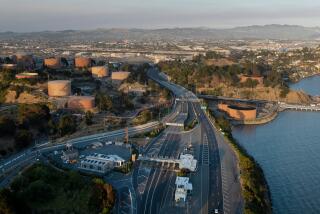No Panic Button for Houston Over Compaq
- Share via
HOUSTON — A home-grown company whose seeds were planted by three engineers conspiring at a pie shop in 1982, Compaq Computer Corp. has represented the future for Houston’s economy, one that’s connected to the shiny world of information technology and not solely dependent on the boom-and-bust cycles of oil.
So when the announcement came in September that Compaq intended to merge with Hewlett-Packard Co., the psychological setback was palpable. Compaq would lose its name, relinquish its headquarters to California and probably lose hundreds of jobs.
Six months later, however, Houston has recovered from the blow to its ego and come to realize that the company would not disappear overnight, even if its fire-engine-red logo does.
“The issue is more related to prestige than actual jobs,” said Barton Smith, economics professor and director of the Institute for Regional Forecasting at the University of Houston.
“Compaq has got an employment base of 10,000 in an economy of 2.1 million workers. Houston has created 60,000 jobs a year. So if we were to lose half the remaining employment base at Compaq, you’re talking about less than one-tenth of the jobs we create in a single year. Now, that’s not trivial, but that’s nowhere near disastrous.”
Compaq, Houston’s 10th-largest employer, eliminated 2,000 jobs in the city last year, about a fifth of the company’s worldwide layoffs. As part of the merger, 10% of the combined workforce would be axed in pursuit of $2.5 billion in cost cutting. In Houston, that would mean roughly 1,000 jobs lost.
Houston certainly has seen worse. The oil bust of the mid-1980s laid to waste 225,000 jobs. The bankruptcy of Enron Corp. has left 4,000 jobless. Continental Airlines slashed 2,000 jobs in Houston last year to cope with the slump in air travel.
That doesn’t mean Houston can shrug off the effects of a merger. In the last two decades, the city went on a tear to diversify its economy, and Compaq played a vital role in helping to pitch the city as a hospitable place for technology companies to do business.
“They were our headliner, our banner when we recruited companies,” said Jim Kollaer, president of the Greater Houston Partnership. “In 1982, 80% of the economy here was energy related. Today, it’s about 45%. From technology to services to manufacturing, a number of companies have come here as a result of Compaq.”
Although the merged company’s presence in the city probably would remain substantial, the loss of its headquarters would be a blow to the city’s efforts to attract new business.
“It would remove one from the quiver of arrows the city can use,” said Dennis Adams, professor at the University of Houston Bauer School of Business. Between the Enron fiasco, the high-profile child-drowning trial of Andrea Yates and a flood last June that left more than $1 billion in damages, “Houston has not had great press lately. Compaq would just be one more thing. Those perceptions are hard to override in corporate boardrooms across the country.”
Compaq is still a major player in this city of 4.4 million. Compaq Center is home to the city’s basketball and hockey teams. The company donates $50,000 a year to Houston’s Alley Theatre. It sponsors the city’s marathon. It has contributed half a million dollars each year to the Texas chapter of the United Way. Its employees volunteer in all manner of charities, from Habitat for Humanity to Star of Hope Mission.
But when talking to Houston nonprofits about corporate giving, one is more likely to hear about the largess of Dynegy Inc., Vinson & Elkins and Exxon Mobil Corp. And their executives play the part of civic leaders, jumping into the gap left by Texas’ laissez faire-style of government and carving their names on the city’s arts centers. Jesse Jones, a financier and newspaper publisher, built Jones Hall, home to the city’s symphony. Gus Wortham, a cattle baron and insurance magnate, lent his name to Wortham Center, built entirely with private funds.
“Most people know Houston from years gone by,” said the city’s mayor, Lee P. Brown. “They don’t know we have one of the best-looking skylines in America. They don’t know we’re investing $2 billion in our port, $2.8 billion in our airport. They don’t know we have the second-largest port in the country. They wouldn’t know we’ve doubled our population in the last decade, that our economy is one of the most diverse in America.”
More to Read
Inside the business of entertainment
The Wide Shot brings you news, analysis and insights on everything from streaming wars to production — and what it all means for the future.
You may occasionally receive promotional content from the Los Angeles Times.










